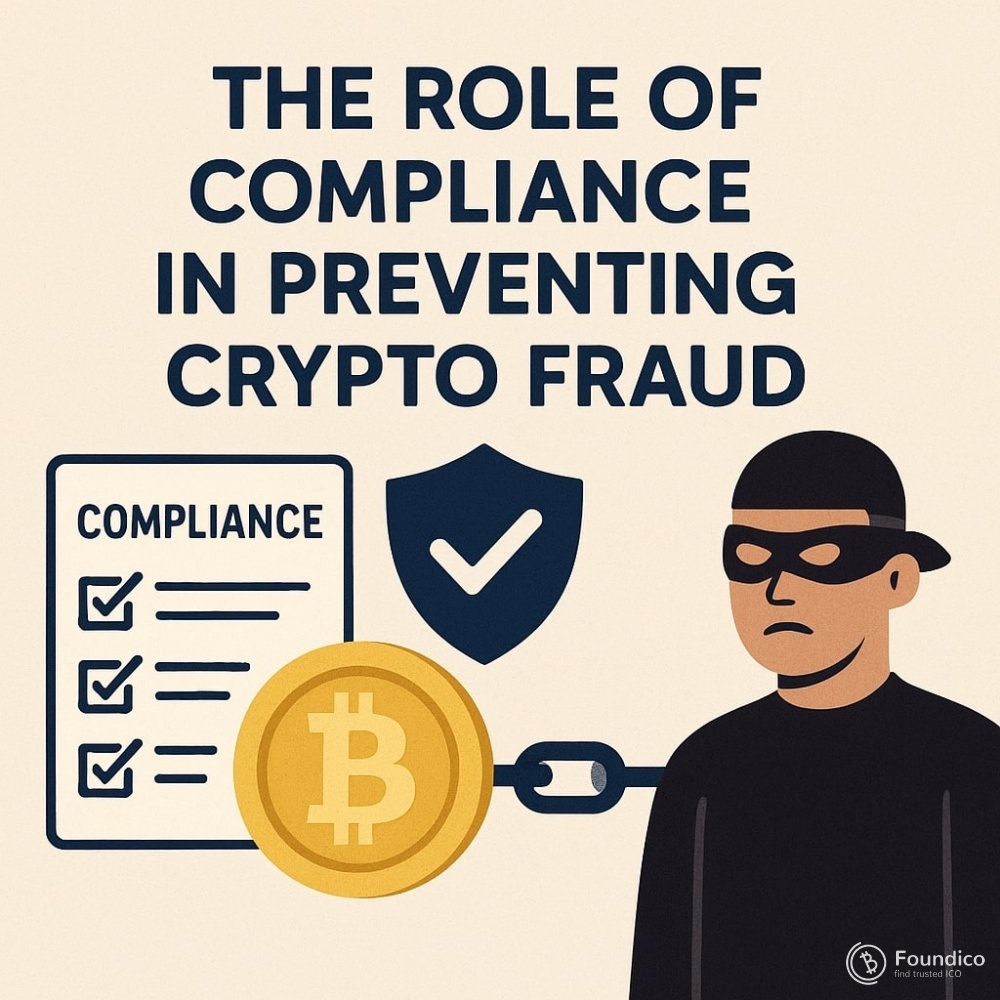The Role of Compliance in Preventing Crypto Fraud

By Dr. Pooyan Ghamari – Swiss Economist and Visionary
Introduction: Compliance as the First Line of Defense in Crypto
The rapid expansion of the cryptocurrency market has introduced tremendous opportunities for innovation and wealth creation. However, this explosive growth has also made the space fertile ground for fraud, scams, and illicit activities. To safeguard investors and maintain market integrity, compliance frameworks are indispensable in preventing crypto fraud.
This article explores the critical role compliance plays in mitigating risks, enforcing accountability, and fostering trust within the crypto ecosystem.
1. Understanding Crypto Fraud and Its Impact
Crypto fraud manifests in many forms—from Ponzi schemes and phishing attacks to market manipulation and wash trading. These fraudulent acts can cause significant financial losses, damage reputations, and ultimately stunt the broader adoption of blockchain technology.
The lack of physical intermediaries and the pseudonymous nature of transactions often embolden scammers, creating complex challenges for regulators and market participants alike.
2. What Is Compliance in the Crypto World?
Compliance refers to the set of policies, procedures, and controls designed to ensure that organizations adhere to legal and regulatory requirements. In the context of cryptocurrencies, compliance often involves:
-
Anti-Money Laundering (AML): Detecting and preventing money laundering and terrorist financing.
-
Know Your Customer (KYC): Verifying the identity of users to prevent fraud and unauthorized access.
-
Transaction Monitoring: Analyzing patterns to detect suspicious or illicit activities.
-
Data Privacy and Security: Protecting customer data from breaches.
-
Reporting and Transparency: Maintaining records and reporting to authorities as required.
Through robust compliance programs, crypto businesses can identify and mitigate fraud risks before they escalate.
3. Key Compliance Measures to Prevent Crypto Fraud
a) Rigorous Customer Due Diligence (CDD)
Effective KYC processes require crypto exchanges, wallets, and other service providers to verify users’ identities, assess risk profiles, and monitor behavior. By preventing anonymous or fake accounts, firms limit opportunities for fraudulent actors.
b) Transaction Surveillance and Analytics
Blockchain’s transparent ledger allows for detailed transaction tracking. Compliance teams use sophisticated analytics tools to flag unusual transactions, such as:
-
Sudden large transfers inconsistent with user history.
-
Funds moving to known illicit addresses.
-
Patterns indicative of layering or structuring.
These insights help detect fraud early and support law enforcement investigations.
c) Staff Training and Awareness
Employees must understand compliance protocols and be vigilant for red flags. Regular training ensures teams can identify potential fraud attempts, phishing schemes, or insider threats.
d) Regulatory Reporting and Cooperation
Prompt reporting of suspicious activities to regulators and law enforcement enhances overall ecosystem security and builds institutional trust.
4. Compliance Challenges Unique to Crypto
Despite its benefits, compliance in crypto faces notable obstacles:
-
Decentralization and Anonymity: DeFi platforms and peer-to-peer transactions reduce control points, complicating KYC enforcement.
-
Rapid Innovation: New tokens, smart contracts, and platforms emerge frequently, outpacing regulatory clarity.
-
Cross-Border Nature: Global transactions involve multiple jurisdictions with different rules and enforcement capabilities.
-
Resource Intensity: Implementing and maintaining compliance programs can be costly and complex, especially for startups.
Addressing these challenges requires adaptive compliance strategies and collaboration between regulators and industry players.
5. The Role of Regulatory Frameworks in Supporting Compliance
Regulators worldwide are increasingly setting clearer standards for crypto compliance:
-
The Financial Action Task Force (FATF) has established “Travel Rule” guidelines requiring crypto firms to share sender and receiver information.
-
The European Union’s Markets in Crypto Assets (MiCA) regulation aims to harmonize crypto compliance across member states.
-
In Switzerland, the FINMA regulator enforces strict AML/KYC rules within its “Crypto Valley,” fostering a compliant and innovative environment.
Such frameworks empower compliance programs by providing clarity, consistency, and enforcement tools.
6. Benefits of Strong Compliance for the Crypto Ecosystem
-
Investor Protection: Reduces fraud risk and builds confidence in crypto markets.
-
Market Integrity: Minimizes manipulation and illicit activities.
-
Legal Safeguards: Helps businesses avoid fines, sanctions, and reputational damage.
-
Sustainable Growth: Establishes trust that encourages mainstream adoption.
In essence, compliance is not just a legal obligation but a strategic asset.
Compliance as a Pillar of Trust and Security
In the volatile and innovative world of cryptocurrencies, compliance stands as a vital pillar protecting participants from fraud and preserving the integrity of the ecosystem. While challenges remain, continuous improvement in compliance technologies, global regulatory coordination, and industry commitment can significantly reduce crypto fraud.
As a Swiss economist and visionary, I advocate for proactive compliance cultures within crypto firms—because safeguarding the future of digital finance depends on trust, transparency, and accountability today.
Dr. Pooyan Ghamari is a Swiss economist and visionary specializing in digital economies, regulatory innovation, and financial security.

 SUBBD - THE ULTIMATE CONTENT CREATION PLATFORM
SUBBD - THE ULTIMATE CONTENT CREATION PLATFORM